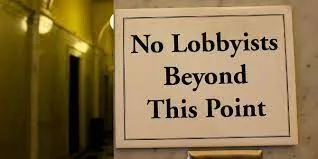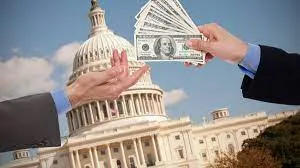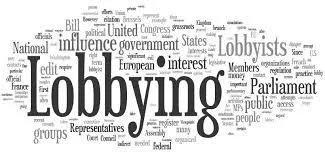Proof about Lobbyists in Politics

The influence of lobbyists in politics has been a contentious issue in recent years due to the perceived power that they hold over elected officials and the policies they help shape. Lobbyists in politics have been accused of buying influence in the halls of power, and their presence in the political arena has raised questions about the effectiveness and fairness of the political process.
In this paper, we will explore the different types of lobbying activities and the various ways in which lobbyists attempt to influence decision-making in government. We will also discuss the arguments both for and against lobbying in politics and the legal regulations that have been put in place to ensure that the process is conducted fairly and ethically.
The Covert Power of Lobbyists in Politics
Lobbying in politics has become a powerful force in the modern world. Lobbyists are present in many countries, and their influence in politics is often difficult to detect. However, their activities are pervasive and can have a significant impact on policy-making.
Lobbyists in politics are individuals or organizations that seek to influence legislation or public policy. They are typically employed by businesses, trade associations, or organizations that have a vested interest in the outcome of policy-making decisions.

Lobbyists use a variety of methods to influence policy, including direct contact with policymakers, public relations campaigns, and research and analysis. May also be involved in organizing political campaigns and fund-raising efforts. They often use their financial resources and social networks to gain access to decision-makers and shape public debate.
At the same time, lobbyists can be a force for good. They can help ensure that the interests of their clients are represented during the policy-making process. They can also provide valuable information and insight to policymakers.
Uncovering the Impact of Lobbyists on Politics
Lobbying is an integral part of the political landscape in the United States and around the world. Lobbyists are professional advocates who represent the interests of corporations, unions, and other organizations before government officials. Through a variety of tactics, including providing research, attending meetings, and making campaign donations, lobbyists seek to influence policy outcomes.
Lobbyists have a powerful impact on politics, particularly in the US. Are closely involved in the legislative process, from crafting bills to advocating for their passage. They are also involved in the lobbying of executive agencies and have considerable influence over the implementation of policy.

Lobbyists also have a major impact on electoral politics. Lobbyists often make large campaign contributions to candidates they support, helping to shape the politics of an election.
Overall, lobbyists have a significant impact on politics, both in the US and around the world. Through their advocacy efforts, they can shape policy outcomes, influence elections, and shape public opinion. As such, it is important to understand the role and influence of lobbyists in order to better understand the political landscape.
The Increase in Lobbyist Spending on Political Campaigns
In recent years, lobbyist spending on political campaigns has seen a dramatic increase. According to the Center for Responsive Politics, the amount of money spent by lobbyists on federal campaigns increased by almost 17 percent between 2014 and
This increase in spending is due in part to the fact that political campaigns have become increasingly expensive. The primary purpose of lobbyist spending is to influence lawmakers and their decisions. They typically donate money to campaigns in order to gain access to elected officials and to encourage them to support legislation that is favorable to their particular interests.
Lobbyists in politics may also be hired by organizations to provide advice on how best to influence lawmakers. The amount of money spent by lobbyists on political campaigns has a significant impact on the outcome of elections. By donating money to campaigns, lobbyists can help to sway the vote in favor of their favored candidates.
The increase in lobbyist spending on political campaigns has raised concerns about the potential for corruption in the political system. It is important for citizens to understand the role of lobbyists in the political process and to take steps to ensure that their voices are heard and that their interests are represented.

How Lobbyists Influence Major Political Decisions
Lobbyists in politics play a key role in influencing major political decisions in the United States. They are employed by large companies, trade associations, and other organizations to influence legislation and executive branch policy. They use a variety of tactics to influence decision-makers in the government, including providing technical expertise, offering campaign contributions, and persuading lawmakers to support their positions.
Lobbyists are experts in navigating the complex regulatory environment. They use their knowledge of the legislative process to craft effective strategies for influencing decisions. Are adept at building relationships with elected officials and their staff to help sway their opinions. Provide technical advice on the implications of proposed legislation or regulations and are often used as a source of information for legislators.
Lobbyists also use campaign contributions to influence political decisions. Often contribute to the campaigns of incumbent lawmakers to help ensure their re-election. This gives them access to the decision-makers and helps them shape the conversation surrounding major political decisions.
In short, lobbyists have a significant influence on major political decisions in the United States. They use their expertise to build relationships with lawmakers, donate money to campaigns, and present persuasive arguments to sway opinions. Are an important part of the American political system and play a critical role in shaping public policy.
The Role of Lobbyists in Shaping Political Discourse
Lobbyists in politics play a critical role in shaping political discourse. They are individuals or organizations that are hired to influence public policy by representing the interests of their clients. Are typically hired by interest groups, corporations, and other entities to advocate for their causes or interests.
Lobbyists use a variety of strategies to influence political discourse. They often use their contacts in government to advocate for their causes by providing policy advice and analysis, meeting with decision-makers, and organizing events to raise awareness. May also use media campaigns to shape public opinion and persuade the public to support or oppose certain policies.

The influence of lobbyists in shaping political discourse is undeniable. They are able to shape the conversation by providing expert analysis and opinion on a range of issues and by providing financial support to candidates who share their views.
Despite the influence of lobbyists in shaping political discourse, it is important to remember that they do not have the power to determine public policy. It is up to the public to decide which policies to support and which to reject. However, the role of lobbyists should not be overlooked. By providing expert analysis and opinion, and by creating media campaigns to influence public opinion, lobbyists can have an important role in shaping political discourse.
The Secretive Practices of Lobbyists in Politics
The practice of lobbying has been an established part of politics for centuries. Lobbyists in politics are professionals who are employed to influence the decisions of legislators and other public officials. While lobbying is a legitimate means of influencing the lawmaking process, some of the secretive practices of lobbyists can be considered questionable.
In the United States, lobbyists are regulated by the federal government. Lobbyists in politics must register with the Secretary of the Senate and the Clerk of the House of Representatives and provide detailed information about their activities and clients. Despite these regulations, lobbyists are not required to disclose all of their activities.

They are well-known for their ability to influence public officials behind closed doors. Lobbyists often use private meetings, expensive gifts, and campaign contributions to persuade legislators to vote or act in a certain way. Also use less-than-transparent tactics such as astroturfing, which is a method of disguising a corporate-sponsored message as a grassroots campaign.
The secretive nature of lobbying can lead to a lack of accountability. Lobbyists in politics are often able to skirt around laws and regulations by using loopholes or taking advantage of a lack of enforcement. This can lead to public policies that are not in the public’s best interest or to the corruption of public officials.
The Impact of Lobbyists on Governmental Policy
Lobbyists in politics are individuals or organizations that seek to influence governmental policy. Lobbyists have become increasingly influential in government decision-making in recent years, and their impact can be seen in a variety of ways.
Are often involved in the policy-making process from the very beginning. They can provide valuable input on the development of legislation, often by helping to draft the language of bills. May also be consulted in the review process, helping to inform lawmakers of the potential impact of proposed legislation. Lobbyists may also be influential in the implementation of policy, providing guidance to legislators on how to best enact the desired policy outcomes.
The influence of lobbyists is also seen in the funding of legislative campaigns. Lobbyists often donate large sums of money to political campaigns, seeking to influence the outcome of elections. This can lead to a situation where lawmakers are more likely to take the advice of lobbyists when making policy decisions, as they are often the ones providing the necessary funds for their campaigns.
Overall, lobbyists play an important role in the policy-making process. Their influence can often be seen in the way that laws and regulations are written and implemented. It is important for citizens to be aware of the influence of lobbyists in order to understand how policy is shaped and to ensure that their own interests are represented.
Understanding the Role of Lobbyists in Political Campaigns
Lobbyists are individuals or organizations that seek to influence the decisions made by government officials and elected representatives. May seek to influence policy, legislation, regulations, and even budgets. They are often employed by corporations, trade associations, or other special interest groups.

Lobbyists play an important role in political campaigns. Provide valuable insights to candidates about the issues that are important to their constituents and can help shape the messages and platforms of the campaigns. Also help campaigns by connecting the candidates to individuals and organizations with the resources to help fund the campaign.
Lobbyists may also be used to influence the outcomes of elections. They may use their connections to influence the media coverage of the campaigns, or to help shape public opinion in favor of the candidate they are supporting. Additionally, lobbyists may be used to reach out to government officials and elected representatives to influence their voting decisions.
The evidence shows that lobbyists have an enormous influence in politics, from influencing legislation to providing campaign contributions. While there are some regulations on lobbyists, their influence can still be felt in many different areas of policy-making. As such, it is important for citizens to be aware of the influence and power of lobbyists.